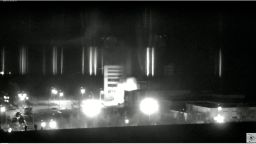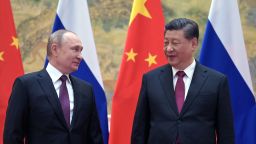The 30 member countries of NATO met in Brussels on Friday to discuss the alliance’s next steps in Ukraine. Diplomatic efforts have failed to end chaos in the country, eight days after Vladimir Putin ordered Russian troops to invade.
The situation inside Ukraine seems unlikely to improve any time soon. A 40-mile Russian convoy headed for the capital, Kyiv, has been stalled for days as Ukrainian fighters hold key areas, while Russian troops have claimed other key strategic areas and, as of this morning, are occupying the Zaporizhzhia nuclear power plant.
Despite the bleak situation on the ground, NATO is unwilling to get directly involved in the conflict — including setting up a no-fly zone — beyond supporting Ukraine’s resistance to an invasion that is killing innocent civilians.
NATO’s Secretary-General, Jens Stoltenberg, said on Friday that a no-fly zone over Ukraine is not an option being considered by the alliance. “We’ve agreed that we should not have NATO planes operating over Ukrainian airspace or NATO troops on Ukrainian territory,” he said.
What is a no-fly zone? A no-fly zone is an area where certain aircraft cannot fly for any number of reasons. In the context of a conflict such as the one in Ukraine, it would probably mean a zone in which Russian planes were not allowed to fly, to prevent them from carrying out airstrikes against Ukraine.
NATO has imposed no-fly zones in non-member countries before, including Bosnia and Libya. However, it is always a controversial move because it means getting semi-involved in a conflict without fully committing ground forces.
What would happen if NATO imposed a no-fly zone? The problem with military no-fly zones is that they have to be enforced by military power. If a Russian aircraft flew into a NATO no-fly zone, then NATO forces would have to take action against that aircraft. Those measures could include shooting the plane from the sky. That would, in Russia’s eyes, be an act of war by NATO and would likely escalate the conflict.
Why hasn’t NATO imposed a no-fly zone? Neither Ukraine nor Russia is a member of NATO. Russian President Vladimir Putin clearly sees NATO as a direct threat to his authority and has recently criticized its expansion toward Russia, using it as justification for his invasion of Ukraine.
As a result, NATO is extremely reluctant to become directly involved in the Ukraine conflict with a rival nuclear power. While it supports Ukraine’s resistance and recognizes Putin’s actions as an invasion of a sovereign nation, the alliance is simply not prepared to do anything that could be interpreted as a direct act of war on Russia and risk an escalation that could lead to the use of nuclear weapons.
Why does Russia feel threatened by NATO? Putin has long believed that Russia got a bad deal after the breakup of the Soviet Union — something he has called the “greatest geopolitical catastrophe of the 20th century.”
He has complained that NATO has, over time, expanded its borders by admitting Eastern European countries that were once part of the Soviet Union — meaning Russia now shares a land border with the world’s largest military alliance, thus reducing his geopolitical power in what was once Moscow’s sphere of influence.
As recently as February, he was demanding that NATO scaled back to the borders of 1997, before the Baltic nations of Latvia, Lithuania and Estonia, the latter two of which border Russia, joined the alliance.
Read the full analysis here.






















